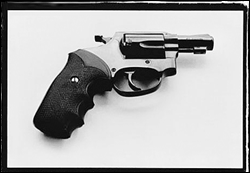Untitled Document

As a US Senator from Texas, Kay Bailey Hutchison splits time between her home
state, where she is allowed to own practically any weapon invented and can even
carry a concealed handgun, and the District of Columbia, where she can’t
even keep a .357 Magnum in her house. For 12 years she has managed to abide this
without complaint, but apparently she’s had enough. In May, she filed a
bill to overturn DC’s gun-control laws, and this week she indicated that
she has more than 30 co-sponsors and intends to push it to the floor for a vote
in the near future.
The bill would, in one swoop, negate all the gun laws the district has adopted
over the past 30 years, including pre-purchase criminal-background checks and
bans on semi-automatic weapons and cop-killer bullets. If it passes the Senate,
it is expected to breeze through the House, which passed a similar bill last
September.
In the press release announcing the bill, Hutchison is quoted saying, apparently
without irony: "The rights guaranteed by the Constitution do not end at
the borders of Washington, DC."
In fact, the bill is an example of the opposite: unlike everyone else in North
America, DC residents can have their own local laws rewritten by a group —
the US Congress — in which they cannot elect a voting member.
Hutchison’s statement refers, of course, to the Second Amendment, which
makes the quote doubly ironic; the bill is relevant only because the constitutionality
of DC’s gun laws has been upheld against challenges sponsored by the National
Rifle Association and the Cato Institute.
The mayor, police commissioner, city-council chair, and virtually every other
Washington politician have spoken out against the bill. Meanwhile, crime in
DC is declining under the current laws. Homicides dropped 20 percent in Washington
last year to a 20-year low, and are down another 17 percent so far this year.
"It would really be hard to find a more unified consensus behind any policy
stronger than the one behind gun control" in the district, says Casey Anderson,
spokesperson for the Washington-based Coalition To Stop Gun Violence —
except, perhaps, for opposition to congressional meddling in DC home rule.
All of which has nothing to do with whether it becomes law. "This bill
is primarily designed to allow Republican members of the House and Senate to
pose as gun-rights fundamentalists for the benefit of their base," says
Anderson.
"One would hope that the Congress would have better things to worry about
than flooding the nation’s capital with guns," says Sean Tenner,
chairman of DC for Democracy, which lobbies for DC-statehood rights. "But
I’ve been wrong before."

